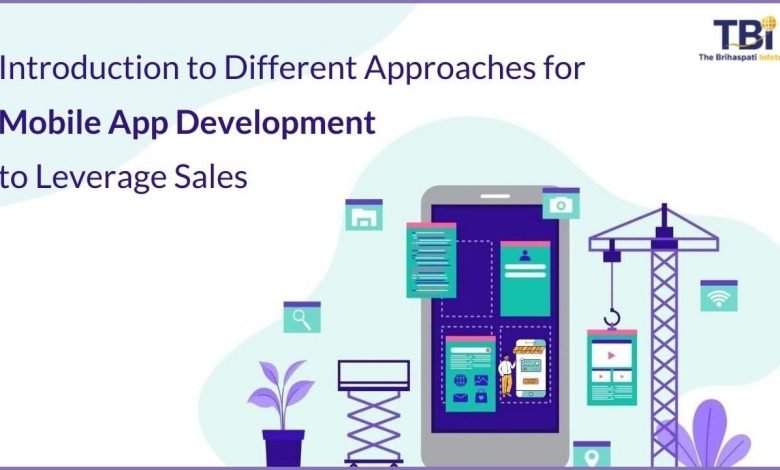
Introduction to Different Approaches for Mobile App Development to Leverage Sales
Mobile applications have become crucial for businesses trying to enhance their accessibility. It can help merchants in leveraging profits by showcasing their products efficiently and providing ease of purchase for multiple devices. If your aspirations involve similar goals, to get started you must hire android app developer and start planning your application. However, planning a perfect android app is easier said than done. It involves multiple crucial steps in which you must make informed decisions to ensure long-term success. Amongst such scenarios choosing the right approach for android app development is a crucial one.
This article will provide insights that can assist you and hire android app programmer in choosing the right development approach. So without further adieu let’s get started.
Different Approaches for Mobile App Development
With the rapid evolution of technology, ways through which you can build mobile applications have expanded rapidly. This as a result has made it easier for businesses to access affordable and faster development. There are three major approaches for creating mobile apps as listed below:
- Native app development
- Hybrid app development
- Cross-Platform app development
Let’s dive deep into each of these approaches to help you in making better choices.
Native App Development
Native app development involves creating platform-specific applications for android and iOS devices. This also includes choosing platform-specific technologies for building the required mobile application for your business. For Android native application development you can adapt to Java or Kotlin. For iOS native app development you can adapt to either Objective C or Swift.
Pros of Native App Development
- Native app development helps your app in engaging with the device’s hardware such as GPS, camera, microphone, etc. This can assist you in adding device-specific features with ease.
- If you want to serve users at low connectivity zones, Native App Development can be a great option. As native apps can easily provide offline functionalities to users making your services accessible even when they have weak connections.
- Since with a native app you will develop applications dedicated to specific platforms, it will always ensure high performance. This makes improving the UX of your app much easier.
- Due to the OS-specific development Native apps also provide higher security. This makes data protection much easier for merchants.
Cons of Native App Development
- Native app codes are usually not reusable. This can increase the development time during the app development process.
- Also, to reach android and iOS users you will have to create separate apps. This will cause an increase in the development cost as well.
- Native app development also comes with high maintenance costs. This can make running business effortlessly impossible for merchants with a limited budget.
Hybrid App development
Hybrid apps are somewhat an amalgamation of native apps and web solutions. In this, the code is written once and can be utilized for multiple platforms. During the development of Hybrid Apps, developers embed the code written using HTML, CSS, and JS into the native environment. For this, hire android app developer can use plugins such as Ionic Capacitor, Apache Cordova, etc.
We can divide Hybrid apps into two major components. A backed that provides functionality and a native viewer which is usually used for making the backend functionality visible.
Pros of Hybrid App Development
- If you plan on creating a minimum viable product for a quick launch, choosing Hybrid app development can be an amazing option. As in this, you can easily expand the functionality later.
- Hybrid apps are also much easier to maintain as compared to Native application development technologies.
- The Hybrid app development lifecycle also sports unified development. This makes app development on a limited budget easier for startups.
Cons of Hybrid App Development
- Hybrid apps fail to provide offline support to the users. This in the long run can create accessibility issues for merchants.
- Also, in a Hybrid application elevating native device features can also become quite challenging for users.
Cross-Platform Application Development
In cross-platform app development, mobile app developers can easily create reusable codes for different platforms. In this, your hire android app developer will have to write code once which can later be used on multiple platforms.
Pros of Cross-Platform Application Development
- If you need fast development and rapid launch then cross-platform development can be a perfect choice. As in this, you can easily bid adieu to the process of creating platform-specific changes.
- Also, the cross-platform app development cost is quite affordable as it provides reusable code.
- Further, cross-platform app development also makes it easier for merchants to maintain and regularly update their mobile applications.
Cons of Cross-Platform Application Development
- Cross-platform applications have complicated development life cycles. This made implementing complex functionalities quite confusing.
- Integration of cross-platform apps in a local setting is also quite impossible for merchants.
The Final Verdict
Making the right choice between different app development approaches can be quite confusing. To make the right choice, understanding what your business needs are a must.
If you are planning to elevate native features while providing unique and unmatched performance native application development would be perfect. Further, if you need an MVP without giving up on UI/UX efficiency Hybrid app development would be a great choice. Moreover, for businesses tight on budget and with time constraints, cross-platform app development would be a perfect choice.
So, access your business requirements today to choose a suitable approach for development and access higher profits and sales.



